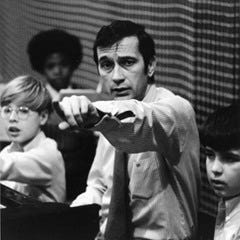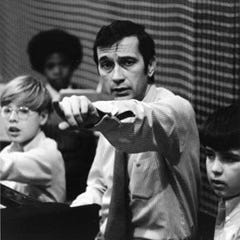When you’re twelve years old, you don’t think that you are being prepared for life-changing events that will happen to you in your fifties, but maybe sometimes you are. When I was twelve years old my voice was changing, and this was a crisis, because at the age of twelve I was a chorister at St. Thomas Choir School. And I loved to sing.
My mother tells me that as a very young boy I was always singing around the house. We were a church-going family, and my older brother and sister were both singing in the children’s choir at church - something I, apparently, very much wanted to do too. Maybe I was five years old. But I was slow in learning to read, as my mother tells it, and if I wanted to join the choir, I had to be able to read. The challenge seems to have provided just the impetus I required: I upped my reading game so I could sing in the children’s choir - and sing I did!
By the time I was eight, my parents came across this strange little institution: a choir school in the middle of New York City. It was tiny little boarding school in mid-town Manhattan, where boys went to be trained to sing in the choir at a big church on Fifth Avenue. This was an old British tradition that was maintained in only a few other places. Inquiries were made, and, although I have no memory of this, we visited the school and were told that I was still too young to apply, and that we should check back in a year if I was still interested. I’m told that I was still interested at the age of nine, so we returned, and I passed the required academic test, and was sent over to the church to audition for the choirmaster. It was 1976.
Gerre Hancock would have been 42 at the time, and he was already renowned, within the small circle of church music people, as a brilliant organ improviser who was also training a first-rate choir of men and boys to sing the services at the corner of 53rd and Fifth. I do recall that first time I met him. He was not at all imperious; rather, he was friendly and kind. I am almost certain that he had me sing “My country ‘tis of thee.” And I recall that he played two notes on the piano, asking me to sing the higher note one time; then another two notes, and sing the lower. Then he played a triad and asked me to sing the middle note. I think I got it right. The next fall (of 1977), my parents dropped me off at 123 W. 55th Street, where the Choir School was located in those days, and my journey with music and religion and God began in earnest at the age of ten.
I will skip over most of what comes next except in shorthand to say that every morning after we woke, got dressed, and stood by our beds for inspection by the prefects, and after breakfast, the day started with choir rehearsal. Here I learned not only how to read music, but also vocal production, musicianship, and the skills of listening that are so important when you are singing with others in a group. The details are not unimportant, but this is not the time or the place for them. Let me tell you this: we loved Mr. Hancock, whom we all called “Uncle Gerre,” as he encouraged us to do by referring to himself that way. We loved to sing for him, and he made us want to be our best selves. He challenged us, and taught us that at our tender ages we could accomplish with our voices something that only boys our age could accomplish, since these voices we had were perishable gifts, and that our singing could be of the highest possible calibre. We could sing with tonality, finesse, and power; and there was no music we couldn’t manage, no matter how difficult. We could do our best, and we could make it beautiful.
We believed Uncle Gerre when he told us that we could do what we did as well as anyone on earth. He demanded our best, and we gave it to him. He insisted that we pay attention, learn to concentrate, that we listen not only to ourselves, but to one another, to contribute (as choral citizens) to a unified sound that we created by deliberately blending the sound of our voices with one another, and by watching his conducting so that we could sing phrases together that gave shape to the music, by which we helped bring out the meaning of the music and the words we were singing. He taught us how to breathe from our diaphragms, how to sing with a head voice, how to identify intervals, enunciate consonants, and sing uniform vowels, how to count, and how to attack an entrance, and how to cut off a phase together. He taught us how to to sing “spin notes” - sustained high notes that should grow with intensity as you sing through them; and how not to “bear down” by making your voice heavy and flat. He taught us that “rote” is a four letter word and that we should learn to sing using our brains - by reading the music and connecting what we read on the page to what our ears had taught our brains. He taught us to read music by learning to point to the notes as they passed by: our fingers connected to our ears and our eyes, which all connected to our brains, and somehow, having also learned a little something about the musical staff and the notes on the page, this all came together.
And we sang. We sang the Tudor anthems of William Byrd and the Renaissance motets of Palestrina. We sang music by 20th century English composers like Howells, Britten, Walton, Tippett, and Lennox Berkeley, as well as the glorious setting of the Mass in G by French composer Francis Poulenc, and we sang a Bach motet. We sang a lot more, too, including American music by Ned Rorem, and some that Gerre had written himself. Making all of this music had a purpose: it was to worship God. Although we occasionally sang concerts, our regular, weekly task was to sing for the worship of God in church; to facilitate liturgical action and meaning; to offer something to God on behalf of the people of God. We sang the music for Morning Prayer, for Evensong, and for the Holy Eucharist, which in those days was more simply called “Holy Communion.” And on this entire, vast continent of North America, no one did it the way we did or as well as we did. We were only boys, but this was not a children’s choir.
There were many boys whose voices and whose singing was superior to mine. For a long time I occupied the place in the choir stalls immediately beside where Uncle Gerre stood to conduct us. In those days, he did not use a music stand; he shared my music with me, which I held on the music desk at an angle so we could both see it. I was called the “page turner.” To this day I have no idea whether that position reflected a positive or a negative assessment of my singing by Gerre, but I do know that he could hear every note I sang.
By the end of my Seventh Grade year, as I was growing taller; both my body and my voice became huskier. Often a boy’s voice will gain a richer, fuller head-tone in the months before it changes. I heard it happen in other boys’ voices; I don’t know that it really happened to mine, I don’t think so; but it was clear that my voice was getting ready to change.
The Choir School only ran up to Eighth Grade, due to the physiological limitations of its students’ voices. These days, for various reasons, few boys' voices last that long, but that’s another story. In the spring of 1980, we were preparing for the first overseas tour the choir had ever taken: a trip to England, during which we would sing at Westminster Abbey and King’s College, Cambridge, among other places. And Gerre could hear every note I sang, as well as the ones I was struggling to sing. He could hear my voice crack on high notes. He regularly joked with us about the onset of the dreaded peach fuzz on our upper lips. Could he see, from over my shoulder, some fuzz growing on my upper lip? He decided that he thought my voice would last through the England tour, so he assured me that I would go. And so my swan song as a treble chorister was sung in the rarified space beneath the fan-vaulted ceilings of King’s College Chapel, in which the reverberance of the music takes a notoriously long time to die out.
This long wind-up has been leading me to this point, so that I can tell you how I dreaded the time, that I knew would come, when my voice changed, its pitch dropped, and I could no longer sing in the voice that I had been able to use to contribute to so much beauty. Of course, I was conflicted: I was impatient to grow up, but I desperately did not want my voice to change, which would surely usher in a period of diminishing musical returns, fourteen-year-old tenors being not much sought after. Let me put that as succinctly as I can: I dreaded the time that my voice must change.
As I say, when you’re twelve years old, you don’t think that you are being prepared for life-changing events that will happen to you in your fifties, but maybe sometimes you are. I was not expecting to face another experience of a voice-change in my mid-fifties, but in leaving active parish ministry, that is exactly what has happened. For months now, I have been confronting the feeling that my voice has changed and I am no longer able to use it to contribute to the fabric of God’s beauty in the world. This is an old, familiar feeling, and it has hurt.
Only a tiny number of boys anymore look forward with dread to the day their voices will change. It is a source of incomparable blessing to me to have been counted among such a number. It is a rare thing indeed, for a boy to know what a gift he has been given in the fact of his voice, and then to be given the double gift of being trained to use his voice to a high degree of excellence in an enterprise of great beauty for the ennobling purpose of worshiping God.
What I discovered as a child, of course, was that all was not lost, and that a changing voice means that there is a discovery to be made: how to use your new voice for its best and highest purpose. It has taken some time at this later stage of life to discover the same lesson, but lately it has been dawning on me: all is not lost, and I still have a voice that I should employ for its best and highest purpose.
What was true when I was twelve is true when I am fifty-seven: I would have held on to the old voice if I could have, and I hated to see it go. I suppose that I am learning the meaning, over and over again, of the words of the Psalmist that I was first taught to sing by Uncle Gerre: “O sing unto the Lord a new song.”
The call to sing a new song sometimes brings with it the need to take up that song with a new voice. I am not the first person to have to learn this lesson, and I won’t be the last. I’m deeply grateful that I was prepared when I was very young to learn this lesson again, rather later in life. And I remain hopeful that God will help me find ways to use my voice in places where it still takes a long time for the reverberance to die out.
The Tomato Times
See for yourself that the tomatoes are growing taller. they have been joined by some
basil and some mint, which I take to be somewhat lower maintenance.






We’re getting ready to drop off the 12 year old in our house at the same choir school for a week! Every day these days feels like a new song to sing, and sometimes my voice does indeed crack. Tomatoes look great with their new companions!
Loving this article (and feeling the sadness between the lines) and hoping that your tomatoes and herbs spring forth with ample bounty xo